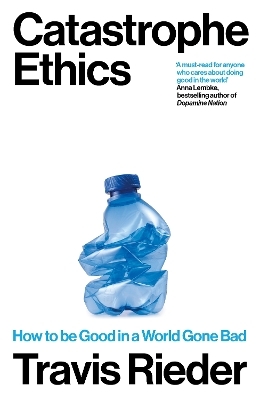
Catastrophe Ethics
How to Be Good in a World Gone Bad
Seiten
2024
Duckworth (Verlag)
978-0-7156-5532-0 (ISBN)
Duckworth (Verlag)
978-0-7156-5532-0 (ISBN)
Philosopher Travis Rieder outlines a new ethics for the age of humanmade catastrophe. We are all asking, in a hyperglobalised world hurtling towards environmental destruction: how do we determine the right actions? Do our individual efforts to avoid plastic or air travel, or to drive electric, make any real difference?
We urgently need to expand our ethical toolkit. The mental tools most of us rely on to ‘do the right thing’ just don’t work when it comes to reasoning about large collective problems. From the small stuff like single-use plastics to major decisions like whether to have children, Rieder defines exactly how we can change our thinking and lead a decent, meaningful life in a scary, complicated world.
We urgently need to expand our ethical toolkit. The mental tools most of us rely on to ‘do the right thing’ just don’t work when it comes to reasoning about large collective problems. From the small stuff like single-use plastics to major decisions like whether to have children, Rieder defines exactly how we can change our thinking and lead a decent, meaningful life in a scary, complicated world.
Travis Rieder is an associate research professor at the Johns Hopkins Berman Institute of Bioethics and an expert in climate change ethics. His first book In Pain was named an NPR Best Book of 2019 and his TED Talk on the same topic has been viewed 2.8 million times. He has written for Psychology Today and the New York Times. Catastrophe Ethics is his second book.
| Erscheinungsdatum | 27.02.2024 |
|---|---|
| Sprache | englisch |
| Maße | 156 x 234 mm |
| Themenwelt | Geisteswissenschaften ► Philosophie ► Ethik |
| Naturwissenschaften ► Biologie ► Ökologie / Naturschutz | |
| Sozialwissenschaften ► Soziologie | |
| ISBN-10 | 0-7156-5532-9 / 0715655329 |
| ISBN-13 | 978-0-7156-5532-0 / 9780715655320 |
| Zustand | Neuware |
| Informationen gemäß Produktsicherheitsverordnung (GPSR) | |
| Haben Sie eine Frage zum Produkt? |
Mehr entdecken
aus dem Bereich
aus dem Bereich


